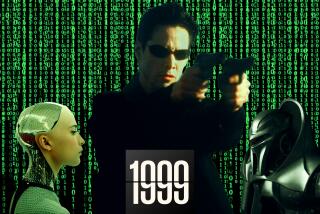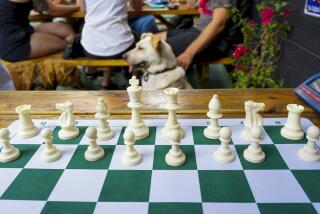Yeah, Yeah, but at Least We Can’t Be Unplugged
- Share via
Poor Garry Kasparov.
He’s an egomaniac, rude and too smart for his own good. Still, you had to feel downright sorry for him the other day when a computer kicked his butt.
Pre-match speculation was that a machine (in this case, the IBM computer Deep Blue) couldn’t outsmart a human at chess. So when the high-strung Kasparov suddenly cracked in a match Sunday that most observers thought he could still survive, it was a truly humiliating moment for him--and enlightening for us.
“I’m a human being,” whimpered Kasparov afterward. “When I see something that is well beyond my understanding, I’m afraid.”
Indeed. Kasparov’s defeat provided one of those wonderful moments when we can all pause and acknowledge one of the unspoken terrors of life at the dawn of the 21st century: technology.
We’re scared as heck of technology, as even Kasparov dramatically demonstrated. The image of one of the most brilliant men in the world yanking his hair and then fleeing tearfully from a machine is only the most startling of examples.
Think about the number of office workers who each day have to summon up the courage to approach a copying machine. Tell the truth: How many of you tiptoe apprehensively to the copying machine when you think no one is looking and feel your heart begin to palpitate when the display pad shows any message other than “Ready”?
“Add toner”?
Forget it.
“Jammed”?
Get me out of here.
What if you have to collate?
Mommmmmmmmeeeeee.
How many of us are terrified of computers? The techno-phobes among us cringe when our machines beep at us, and we go into panic when they actually freeze up or blank out.
Here in the newsroom, the newest computers come equipped with a beep that is loud and offensive, as if the computer is saying, “You stupid idiot. You can’t do that!” It makes you feel like apologizing to it.
And there are so many other anxiety-producing machines in our lives: self-cleaning ovens, telephone answering machines, fax machines, circuit boards everywhere. If you can’t use them--for whatever reason--you feel dumb and defeated.
That’s why it was comforting to see someone as bright as Kasparov feel dumb and defeated. The only thing more satisfying would have been seeing Bill Gates goof.
“Some people may have felt a sense of relief that ‘I’m not the only one who feels anxious about computers. Even the best chess player in the world was defeated by one,’ ” says clinical psychologist Carol Goldberg, an expert in computer anxiety in New York City.
There are several reasons why we feel so woefully inadequate.
“The computer is able to do something incredibly fast,” Goldberg says. “This is the strength of the computer. In an infinitesimal amount of time, it can process huge amounts of data. I think that is what scares us.”
Computer anxiety expert Michelle Weil, a psychologist in Orange, has another theory.
“One of the things that intimidates and frustrates people about technology is that technological workings are invisible. And we are used to being able to put our hands on things, break them down and build them back up again. That’s the way we gain knowledge about things. That gives us a sense of control, a sense of safety. With technology, all that is gone,” says Weil, who is writing a book about our anxieties with technology.
We could, of course, take apart a computer. But, she says, that wouldn’t help most people understand “how does e-mail that I type in here get to Australia in 30 seconds?”
Experts recommend taking a deep breath and facing our technology fears through trial-and-error experience. But, at times like this, it may also be useful for Kasparov, and all of us, to look at the other side of the coin.
Kasparov, for example, was beaten by a machine that had been programmed by a team of IBM’s brightest humans.
Think about it.





